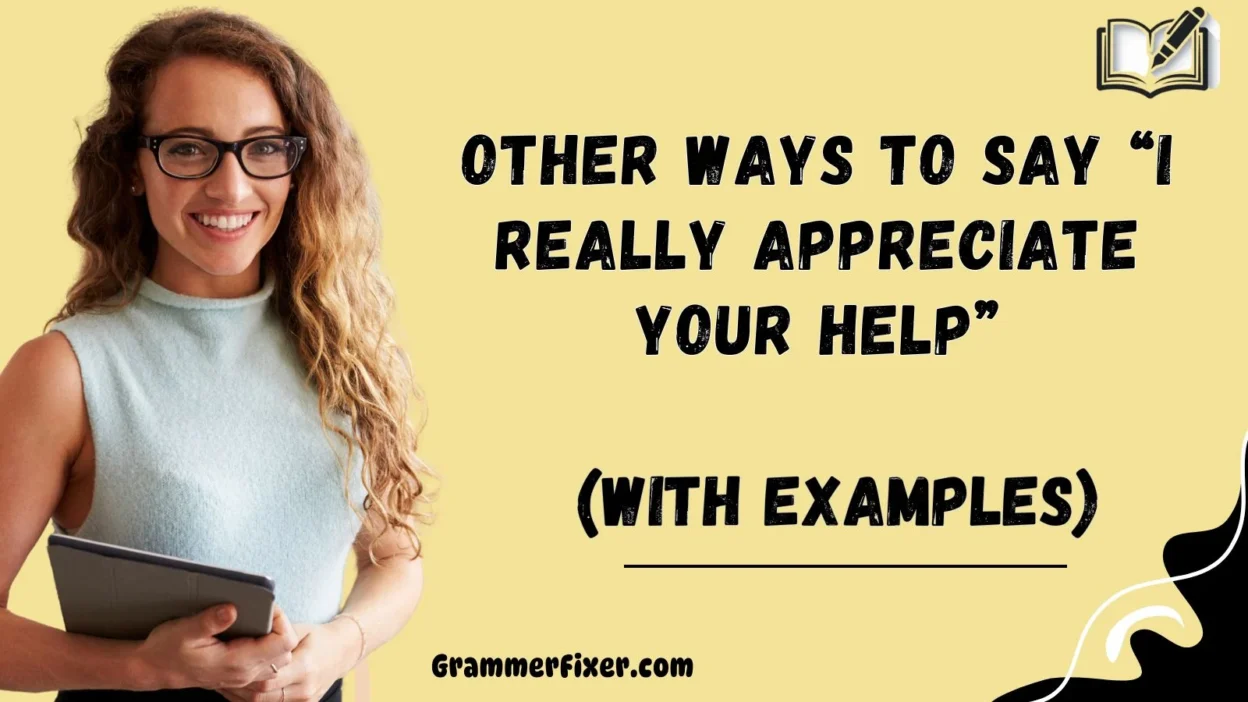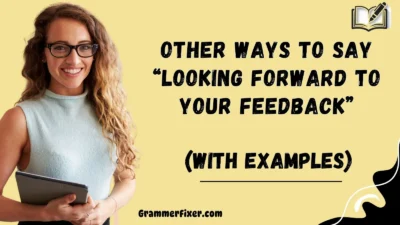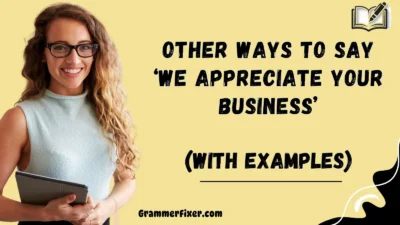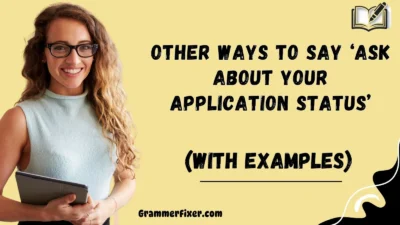Finding the right words to express gratitude can make all the difference in how your message is received. Saying “I really appreciate your help” is kind and polite — but sometimes, you might want to say it in a way that feels more personal, thoughtful, or specific to the situation.
Whether you’re thanking a colleague, client, mentor, or friend, the right phrasing can add warmth and sincerity to your words.
Below are 30 meaningful alternatives you can use to express genuine appreciation with care.
What Does “I Really Appreciate Your Help” Mean?
The phrase “I really appreciate your help” is a heartfelt way to express gratitude for someone’s support, effort, or kindness. It acknowledges that another person went out of their way to assist you — whether through advice, time, or effort.
In simple terms, it means:
“Your support made a difference to me, and I value what you did.”
This phrase carries warmth, humility, and respect — making it a versatile and polite expression suitable for both personal and professional communication.
When to Use “I Really Appreciate Your Help”?
You can use “I really appreciate your help” whenever someone has offered their time, expertise, or assistance — particularly when that support contributed to your success or comfort.
Best moments to use it:
- After someone completes a task or favor for you
- When expressing gratitude in an email or meeting
- To acknowledge consistent support from a colleague or mentor
It’s perfect for professional environments, thank-you emails, or even personal notes where sincerity is key.
Is It Professional/Polite to Say “I Really Appreciate Your Help”?
Absolutely. Saying “I really appreciate your help” is both professional and polite.
It’s a universally acceptable way to express gratitude that works across roles and industries. However, varying your phrasing can sometimes make your communication feel more natural, personal, and memorable — especially when writing to someone you interact with often.
Pros or Cons
Pros:
- Warm and genuine tone
- Suitable for formal and informal settings
- Universally understood
Cons:
- Can sound repetitive if used too often
- May feel generic in highly personal or emotional contexts
That’s why exploring alternative expressions is helpful — to keep your gratitude sounding authentic and thoughtful every time.
1. I Truly Value Your Support
Meaning: A deeper, more emotional way to show appreciation for someone’s continued help.
Explanation: This phrase highlights how much you personally value what the person has done. It adds emotional weight beyond a simple “thank you.”
Example: “I truly value your support on this project — I couldn’t have managed the deadline without you.”
Best Use: Professional or mentorship contexts where ongoing support is being recognized.
Worst Use: Casual chats or when referring to minor favors (like borrowing a pen).
Tone: Warm, respectful, and appreciative.
2. Your Help Means the World to Me
Meaning: Expresses deep personal gratitude.
Explanation: A heartfelt phrase emphasizing that the person’s assistance had a big emotional or practical impact.
Example: “Your help means the world to me — I was really struggling before you stepped in.”
Best Use: Personal thank-you notes or meaningful expressions of appreciation.
Worst Use: Formal corporate emails where a neutral tone is preferred.
Tone: Emotional and sincere.
3. I’m Grateful for Your Assistance
Meaning: A polished and professional alternative to show appreciation.
Explanation: This phrasing keeps gratitude formal yet kind — ideal for workplace settings.
Example: “I’m grateful for your assistance during the client presentation today.”
Best Use: Business emails, client communication, or professional settings.
Worst Use: Informal or emotional situations where warmth is needed.
Tone: Professional and courteous.
4. I Can’t Thank You Enough
Meaning: Shows immense appreciation when words feel insufficient.
Explanation: This phrase conveys that you’re genuinely overwhelmed by someone’s kindness or help.
Example: “I can’t thank you enough for staying late to help me finish the report.”
Best Use: When someone has gone above and beyond.
Worst Use: Routine workplace interactions or small gestures.
Tone: Heartfelt and expressive.
5. I’m So Thankful for Your Support
Meaning: Expresses genuine warmth and gratitude.
Explanation: This version adds emotion while remaining suitable for both personal and professional communication.
Example: “I’m so thankful for your support throughout this process.”
Best Use: When acknowledging consistent help or encouragement.
Worst Use: Highly formal reports or corporate announcements.
Tone: Kind and warm.
6. I Deeply Appreciate Your Effort
Meaning: A sincere way to recognize someone’s hard work or dedication.
Explanation: This phrase goes beyond general gratitude to emphasize recognition of the effort the person put in, not just the outcome.
Example: “I deeply appreciate your effort in organizing the team meeting and ensuring everything ran smoothly.”
Best Use: Professional emails, team acknowledgments, or formal thank-you notes.
Worst Use: Light, everyday interactions or casual messages.
Tone: Respectful, formal, and appreciative.
7. I’m Truly Grateful for Everything You’ve Done
Meaning: A heartfelt phrase that acknowledges both the action and the care behind it.
Explanation: This version adds emotional depth, suggesting the help meant more than just practical assistance.
Example: “I’m truly grateful for everything you’ve done to make this event possible.”
Best Use: When recognizing someone’s significant or ongoing contribution.
Worst Use: In business contexts where brevity and neutrality are preferred.
Tone: Warm, genuine, and deeply thankful.
8. Thanks a Million for Your Help
Meaning: A friendly, enthusiastic way to say “thank you very much.”
Explanation: This idiomatic expression adds personality and energy, making it sound both cheerful and genuine.
Example: “Thanks a million for your help with the report — I really owe you one!”
Best Use: Friendly professional relationships or informal communication.
Worst Use: Highly formal emails, reports, or communication with senior management.
Tone: Casual, upbeat, and warm.
9. I’m So Grateful for Your Guidance
Meaning: A thoughtful way to thank someone for offering advice or mentorship.
Explanation: This phrase is particularly suited to expressing appreciation for someone’s direction or wisdom.
Example: “I’m so grateful for your guidance — your insights helped me make a confident decision.”
Best Use: Mentorship, coaching, or leadership recognition.
Worst Use: When the help was practical rather than advisory (e.g., logistical assistance).
Tone: Appreciative, respectful, and humble.
10. I Sincerely Appreciate Your Time
Meaning: A professional and polite way to acknowledge someone’s effort and time.
Explanation: Perfect when someone took time out of their busy schedule to assist, meet, or review something for you.
Example: “I sincerely appreciate your time and attention during today’s meeting.”
Best Use: Professional communication, client relations, or business correspondence.
Worst Use: Informal or emotional thank-yous.
Tone: Polite, formal, and respectful.
11. I’m Thankful for Your Kindness
Meaning: A warm way to appreciate someone’s caring or considerate gesture.
Explanation: This phrase shifts the focus from help itself to the kindness behind it — ideal when the gesture was thoughtful or compassionate.
Example: “I’m thankful for your kindness when I was feeling overwhelmed.”
Best Use: Personal or emotionally supportive messages.
Worst Use: Corporate or highly formal professional communication.
Tone: Gentle, heartfelt, and personal.
12. Your Support Made All the Difference
Meaning: Recognizes that someone’s help had a significant impact on an outcome.
Explanation: Emphasizes that their involvement directly influenced success or comfort.
Example: “Your support made all the difference in helping the project succeed.”
Best Use: When acknowledging teamwork, collaboration, or pivotal support.
Worst Use: When thanking for minor or routine actions.
Tone: Appreciative and empowering.
13. I’m Beyond Grateful for Your Help
Meaning: Shows deep and enthusiastic gratitude.
Explanation: This phrase adds intensity, ideal for when someone went far above what was expected.
Example: “I’m beyond grateful for your help — you really went the extra mile for me.”
Best Use: When expressing heartfelt thanks for exceptional effort.
Worst Use: In formal communication where strong emotion might feel excessive.
Tone: Passionate, warm, and genuine.
14. I Really Appreciate Your Guidance and Support
Meaning: A thoughtful combination phrase for situations involving both advice and hands-on help.
Explanation: Acknowledges both emotional and practical assistance, offering a balanced tone.
Example: “I really appreciate your guidance and support through this transition.”
Best Use: Mentorship, leadership, or performance-related discussions.
Worst Use: Small or routine workplace interactions.
Tone: Grateful, professional, and balanced.
15. I’m So Thankful for Your Assistance
Meaning: A polite and straightforward alternative for professional use.
Explanation: This phrasing is perfect for expressing gratitude in work settings without sounding overly casual or emotional.
Example: “I’m so thankful for your assistance in resolving the client issue.”
Best Use: Corporate emails, follow-ups, or formal thank-you notes.
Worst Use: Emotional or personal thank-yous.
Tone: Professional, clear, and appreciative.
16. I Couldn’t Have Done It Without You
Meaning: Highlights someone’s essential role in your success or progress.
Explanation: This phrase is powerful because it acknowledges true dependence on the person’s help.
Example: “I couldn’t have done it without you — your expertise made all the difference.”
Best Use: Team appreciation, project success, or collaborative achievements.
Worst Use: Casual remarks or small favors.
Tone: Warm, sincere, and grateful.
17. You’ve Been Such a Great Help
Meaning: A friendly and genuine way to recognize someone’s effort.
Explanation: Simple yet personal, it shows direct acknowledgment without sounding overly formal.
Example: “You’ve been such a great help with getting everything ready on time.”
Best Use: Informal team messages or peer-to-peer appreciation.
Worst Use: High-level corporate or external client communication.
Tone: Friendly, conversational, and positive.
18. I Appreciate Your Willingness to Help
Meaning: Thanks someone for their readiness or attitude to assist, even if they didn’t do much yet.
Explanation: Perfect when the gesture of offering help itself is meaningful.
Example: “I appreciate your willingness to help — it means a lot just knowing I can count on you.”
Best Use: When someone offers support or shows initiative.
Worst Use: After receiving major or completed help (it can sound too mild).
Tone: Polite, thoughtful, and modest.
19. Thank You for Going Above and Beyond
Meaning: Expresses deep appreciation for exceptional effort.
Explanation: Recognizes that the person exceeded expectations or normal duties.
Example: “Thank you for going above and beyond to make sure everything was perfect.”
Best Use: Employee recognition, team leadership, or formal thank-yous.
Worst Use: Small or routine favors.
Tone: Respectful, motivational, and heartfelt.
20. I’m So Appreciative of Your Help
Meaning: A warm and slightly more emotional twist on the original phrase.
Explanation: Keeps the same sentiment as “I really appreciate your help” but adds extra warmth.
Example: “I’m so appreciative of your help this week — you’ve really lightened my workload.”
Best Use: Friendly professional relationships or heartfelt acknowledgments.
Worst Use: Very formal business or client settings.
Tone: Warm, natural, and kind.
21. I Appreciate the Time and Effort You’ve Put In
Meaning: A respectful acknowledgment of someone’s dedication and commitment.
Explanation: Highlights both time and effort, showing that you recognize their contribution in full.
Example: “I appreciate the time and effort you’ve put in to make this campaign successful.”
Best Use: Formal appreciation messages, performance feedback, or professional thank-you notes.
Worst Use: Quick, casual exchanges — it can sound overly formal.
Tone: Professional, polished, and grateful.
22. Your Help Has Been Invaluable
Meaning: Expresses that the assistance given was crucial and deeply appreciated.
Explanation: The word invaluable emphasizes that their help cannot be measured in worth — it was essential.
Example: “Your help has been invaluable in completing this project on time.”
Best Use: Professional acknowledgments, awards, or leadership communication.
Worst Use: Informal chats or small favors.
Tone: Formal, elegant, and appreciative.
23. I Can’t Tell You How Much I Appreciate It
Meaning: Emphasizes overwhelming gratitude beyond what words can express.
Explanation: A powerful way to convey that you’re sincerely moved by someone’s effort or kindness.
Example: “I can’t tell you how much I appreciate it — you really saved me a lot of stress.”
Best Use: Friendly professional or personal settings.
Worst Use: Highly formal or written communications that require concise wording.
Tone: Warm, emotional, and expressive.
24. I’m So Grateful for Your Dedication
Meaning: Recognizes someone’s consistent effort and loyalty.
Explanation: Focuses on long-term commitment rather than a single action, showing deeper appreciation.
Example: “I’m so grateful for your dedication to the success of our team.”
Best Use: Workplace recognition, performance reviews, or long-term project thanks.
Worst Use: Small gestures or casual exchanges.
Tone: Professional, respectful, and sincere.
25. I Truly Appreciate Everything You’ve Done
Meaning: A genuine, all-encompassing thank-you for multiple acts of support.
Explanation: A warm expression that captures ongoing appreciation rather than a one-time event.
Example: “I truly appreciate everything you’ve done to help make this happen.”
Best Use: When acknowledging someone’s continued involvement or mentorship.
Worst Use: Overused for small or everyday tasks.
Tone: Grateful, personal, and authentic.
26. Your Efforts Don’t Go Unnoticed
Meaning: A thoughtful acknowledgment that recognizes someone’s contribution, even if it hasn’t been publicly mentioned.
Explanation: Perfect when you want to affirm that you see and value someone’s behind-the-scenes work.
Example: “Your efforts don’t go unnoticed — I really value your consistency and attention to detail.”
Best Use: Professional recognition, team management, or leadership communication.
Worst Use: Informal or emotional personal interactions.
Tone: Appreciative, respectful, and validating.
27. Thank You for Always Being There
Meaning: Expresses heartfelt appreciation for dependable, ongoing support.
Explanation: Focuses on reliability and emotional steadiness rather than a single act of help.
Example: “Thank you for always being there when I need advice or reassurance.”
Best Use: Personal notes, mentorship acknowledgment, or long-standing relationships.
Worst Use: Strictly professional or transactional communications.
Tone: Emotional, genuine, and caring.
28. I’m So Grateful for Your Understanding
Meaning: Thanks someone for patience, empathy, or emotional support.
Explanation: A graceful way to show appreciation when someone has been accommodating during a challenge.
Example: “I’m so grateful for your understanding while I navigated this situation.”
Best Use: When thanking someone for flexibility, patience, or compassion.
Worst Use: When referring to tangible or task-related help.
Tone: Gentle, warm, and empathetic.
29. Your Help Made This So Much Easier
Meaning: Expresses appreciation by focusing on the direct impact of their help.
Explanation: This phrasing makes gratitude specific and relatable, ideal for team communication.
Example: “Your help made this so much easier — thank you for stepping in when you did.”
Best Use: Teamwork, peer recognition, or casual professional emails.
Worst Use: Very formal or ceremonial situations.
Tone: Friendly, genuine, and conversational.
30. I Appreciate You More Than You Know
Meaning: A deeply personal and emotional way to show profound gratitude.
Explanation: Suggests that your appreciation runs deeper than what words can express.
Example: “I appreciate you more than you know — your kindness truly lifted my spirits.”
Best Use: Personal notes, close colleagues, or heartfelt messages.
Worst Use: Formal or distant professional settings.
Tone: Intimate, warm, and expressive.
Conclusion
Expressing gratitude is more than a polite gesture — it’s a way of building stronger, more meaningful connections with the people around us.
By exploring these 30 alternatives to “I really appreciate your help,” you can express thanks in ways that feel authentic, thoughtful, and context-appropriate — whether you’re writing to a colleague, mentor, client, or friend.
The right words can turn appreciation into inspiration, showing others that their time, care, and effort truly matter.



